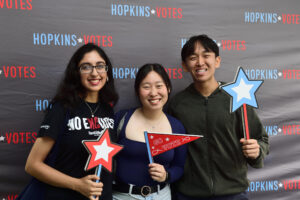For Braunstein, joining Hopkins represents a unique opportunity to collaborate with a remarkable constellation of sociological talent at the SNF Agora Institute. “One of the things that brought me to Hopkins and SNF Agora is the community of sociologists whose careers I have followed and admired,” she explains. “It felt like a really good fit to be in a place with so many people doing overlapping and complementary work to what I do.”
Braunstein’s scholarship aligns with SNF Agora’s mission to strengthen global democracy through research, teaching, and practice. Her research, which appears in leading journals and is featured in major media outlets like The New York Times and The Washington Post, directly supports the institute’s goal of finding sources of democratic resilience in today’s challenged political landscape.
At SNF Agora, Braunstein will continue leading her Meanings of Democracy Lab, a research initiative that brings together undergraduate researchers to study how citizens resist threats to democracy. One current project focuses on resistance to Christian nationalism, which includes her recently released limited podcast series, “When the Wolves Came: Evangelicals Resisting Extremism.”
The podcast tells the story of evangelical Christians standing against extremism within their own communities. “The idea that white conservative evangelicals themselves are critical of Christian nationalism is important to call out,” Braunstein explains. “It shows there’s real contestation in these communities.”
This work connects directly to SNF Agora’s commitment to promoting informed, inclusive dialogue across political and ideological divides. The institute provides an ideal environment for Braunstein’s cross-partisan explorations of democratic engagement.
Braunstein’s newest book, My Tax Dollars: The Morality of Taxpaying in America, examines how paying taxes became a moral battleground in American public life, telling the stories of Americans who view taxpaying as more than a mundane chore.
“Tax debates are very rarely about tax rates,” she observes. “They’re almost always deeper questions about our relationships to each other and how we use the tax system to create that imagined society.”
In our interview, Braunstein elaborated on how taxation has been fundamental to American identity since the nation’s founding: “Resistance to taxation is part of the DNA of the United States,” she explains. “Taxation has always loomed as a symbol and material manifestation of state authority and has been a way that we have negotiated the balance of power between individuals, communities, and the state.”
Yet alongside this resistance tradition, Braunstein notes a fascinating contradiction: “Americans have famously high tax morale,” she points out. “Despite all that talk of resistance and revolt, we pay our taxes voluntarily at incredibly high rates.” Her research examines this tension by studying diverse groups, such as anti-war activists who refuse to fund military actions and anti-abortion advocates protesting “taxpayer-funded abortion.” These interviews reveal how Americans view the relationship between money and citizenship as deeply moral and personal rather than merely transactional.
When asked what she hopes to bring to the SNF Agora Institute, Braunstein emphasizes the importance of including religion in conversations about democracy. “Religion, whether we like it or not, is part of every conversation we’re having about democracy,” she asserts. “It’s not something we can understand with a broad brush as good or bad for democracy, but something that requires nuance and public conversation.” This area of expertise will enhance SNF Agora’s multidisciplinary efforts to surface and foster deep engagement with the complex dynamics of democratic participation.
Despite concerns about America’s democratic future, Braunstein’s work uncovers hope in unexpected places. “The people fighting for pluralistic democracy are incredibly diverse, including liberals and conservatives. It’s not a left-right divide anymore; it’s ‘do you support democracy or not?’”
This insight aligns with her broader perspective that democracy is hard work but worth the effort. As she writes in her public commentary, “Democracy is hard. Especially the kind of pluralistic democracy where diverse and disagreeing people come together to build a common life…. It has been a shared aspiration, a horizon we have reached for but never fully grasped.
As SNF Agora continues building bridges between academic research and real-world democratic practice, Braunstein’s scholarship on ordinary citizens’ engagement with democracy will contribute significantly to understanding how we can strengthen civic life. Her research on taxation, moral resistance, and religious communities adds valuable dimensions to the institute’s mission of promoting dialogue and engagement across lines of difference. Understanding people’s motivations in their engagement with democracy, from faith to fiscal policy, helps us find firmer common ground.


